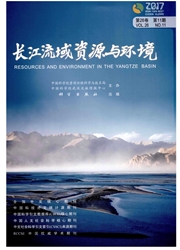

 中文摘要:
中文摘要:
通过对湖北省二县市农户宅基地流转意愿的抽样调查,采用Logistic回归模型,分析农户宅基地流转意愿与区位条件、农户家庭属性特征及经济发展水平等的关系,找出影响农户宅基地流转意愿的主要因素。研究结果表明:目前愿意将自家宅基地进行流转的农户所占比例略高于50%。按作用程度排序,影响农户宅基地流转意愿的因素依次为非农收入占总收入的比重、距县城距离、对政策了解程度、户主年龄、户主学龄;其中,距县城距离和户主年龄的影响方向为负,其它因素的作用方向为正。从区域角度来看,经济较发达地区农户非农收入已占据主导地位,农户的流动性较强,愿意流转的农户所占比例高于社会经济欠发达地区的比例;影响农户宅基地流转意愿的因素及其作用程度也存在一定的区域差异。
 英文摘要:
英文摘要:
In this paper based on the survey of households in two counties in Hubei Province,the Logistic regressive model was set up to analyze factors affecting the households' willingness in rural residential land transfer.The results showed that the proportion of households who were willing to transfer residential land was slightly higher than 50%.According to the extent of affecting the willingness of households,the factors were the proportion of non-agricultural income to total revenue,the distance to county town centre,the households' comprehension about policy,the age of the householder,the school-age of the householder respectively.The impact of the factors such as the distance to county town centre,the age of the householder was negative,and other impacts were positive.From a regional perspective,non-agricultural income of household played a leading role;the mobility of rural households was strong;in developing regions the proportion of households who were willing to transfer was higher than that of less developed regions;regional differentiation affected the households' willingness and their effect degree.
 同期刊论文项目
同期刊论文项目
 同项目期刊论文
同项目期刊论文
 期刊信息
期刊信息
